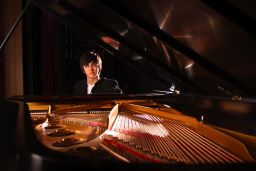Editor’s Note: Charlie Albright is a classical pianist and recipient of the 2014 Avery Fisher Career Grant and 2010 Gilmore Young Artist Award. The opinions expressed in this commentary are his.
Story highlights
Charlie Albright: Classical musical audiences are waning; concerts have become too formal, stiff
He says new venues, improvisation, conversation are bringing the fun back
“Classical music,” in its now-traditional sense, has seen better days. The Metropolitan Opera is only one of the many arts organizations that is having a harder and harder time filling its seats.

The National Endowment for the Arts reported that in 2012, only 8.8% of Americans had attended a classical music performance in the previous 12 months, compared to 11.6% a decade earlier. “Older Americans are the only demographic group to show an increase in attendance over a decade ago,” the NEA study found.
So why aren’t more young people showing an interest in classical music?
It wasn’t all that long ago when classical music was fun. People went to concerts for a variety of reasons: to be moved emotionally, to be entertained, and as a social event, to name a few. Performances were a chance for artists and audiences to connect on a level unattainable in other media, as a form of mutual communication.
Speaking to audiences, spontaneous applause (including in the middle of pieces), and on-the-spot improvisation were commonplace, with performers wooing audiences with their technical and interpretational prowess. That was real classical music.
But all of that changed in the 20th century when “rules of concert etiquette” began incorporating themselves into performances. Suddenly, clapping mid-piece was unacceptable. Applause between movements, or parts, of pieces became that way as well. Regular concertgoers would shoot glares of disdain toward anyone violating such rules.
Coughing? Forbidden. Performers speaking from the stage? Discouraged. Improvisation in a concert? Rarely done and almost never taught in even the most prestigious classical music colleges and conservatories.
With this stifling atmosphere of rules and “appropriateness,” it is no wonder that people (especially youth) are apprehensive and often uninterested in the whole idea of classical music. Somehow, classical music has become inaccessible and unwelcoming.
Some may say that classical music is outdated and because of that, young people aren’t interested. But that contradicts everything I have seen in my profession and everyone I’ve talked to who works closely with students, both in and out of the music industry. Having had the opportunity to meet and teach children of all ages and from all backgrounds, from very small towns lacking music programs in schools to wealthy areas with plenty of arts funding, I have yet to meet a single one who was not genuinely interested in classical music when you discard all of the artificial, “classical” rules that usually accompany it.
Thankfully, this “classical” classical music of the 20th century is dying.
As a pianist, I have the opportunity to help with this. For one, I love to talk to my audiences. Getting on stage and talking casually about each piece and what I think of it, how it makes me feel, and what to listen for immediately brings down the invisible wall between the performer and the audience.
Instead of me standing on stage and them sitting and listening, it becomes an evening of conversation and of sharing emotions with one another through art. Some might criticize my decision, saying that it makes the event less formal. But that is exactly the point.
A few years ago, I began to program improvisation into the main part of my concerts. I would sit down and make up a piece that I had never played before (and couldn’t play again exactly the same way), and eventually morphed that idea into a more interactive session where I ask audience members for random notes on the keyboard.
Once I have four or so notes (i.e. B-flat, C, A, E-flat), the audience and I embark on a new, never-before-played piece that we create together. It is exciting and spontaneous, it is entertaining and interactive. Suddenly, the entire concert hall is involved in something magical that moves us all in a unique way.
Concert venues are also changing. Classical music is performed today not only in concert halls with thousands of seats but also in cabaret-style venues where audience members sip beer and wine while enjoying Beethoven and Chopin.
Breaking down such “classical” rules will kill “classical” music – and thus save it. It will make the artform more accessible, more entertaining, and more disinhibiting, allowing for all of us to share more emotion and passion through the music. It will welcome those of us who are interested yet apprehensive about making the leap to buy a ticket to a concert.
It will encourage more young people to have fun with the performing arts instead of viewing them as a necessary evil that requires a boring practice each day after school.
And it is this death of “classical” music that will bring true classical music more life than ever.
Join us on Facebook.com/CNNOpinion.
Read CNNOpinion’s Flipboard magazine.
Charlie Albright is a classical pianist and recipient of the 2014 Avery Fisher Career Grant and 2010 Gilmore Young Artist Award. The opinions expressed in this commentary are his.





